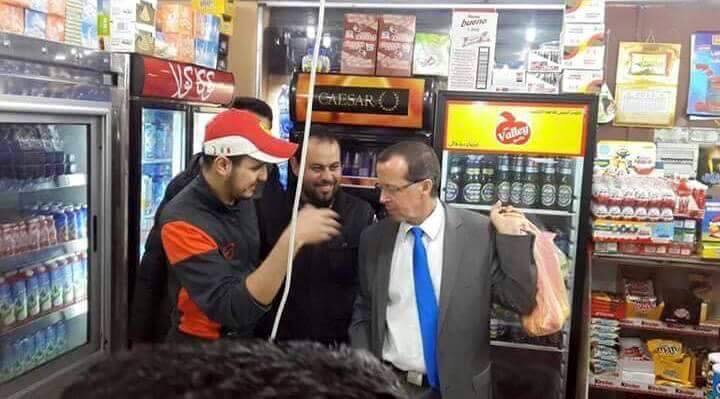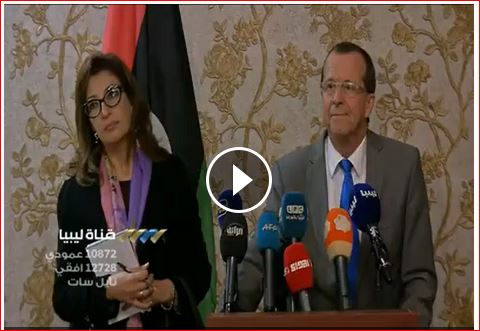By Saber Ayyub and Ajnadin Mustafa.

Tripoli, 1 January 2015:
An attempt by UN envoy to Libya Martin Kobler to convince the Tripoli-based General . . .[restrict]National Congress (GNC) to support the Libya Political Agreement (LPA) agreed in last month in Skhirat and the Government of National Accord (GNA) and led by prime minister-designate Faiez Serraj ended in failure today in talks in the Libyan capital with GNC president Nuri Abu Sahmain. At a press conference afterwards, the deputy GNC president, Awad Abdul Saddeq insisted that there would be no acceptance of the Skhirat deal. Kobler’s own plans to speak to the media meanwhile were prevented by the regime’s foreign media boss, Jamal Zubia, who said the UN envoy did not have his permission to speak to the press.
Kobler did, however, visit a Tawerghan refugee camp in the city and afterwards managed to speak briefly to the press during which he insisted that the LPA was the only deal on the table. It had full international support, he said, could not be changed and had to be accepted.
He also rejected the rival “Libya-Libya” dialogue championed by Abu Sahmain, saying it had to stop.
Kobler, who had secured the support of House of Representative president Ageela Saleh for the LPA at a meeting in Beida yesterday, flew to Tripoli accompanied by his Libya security operations adviser General Paolo Serra to tell the GNC that it could still join the process. In addition to Abu Sahmain, he also met with a number of the regime’s leading figures including Khalifa Ghwell, the head of Tripoli administration, and Mustafa Nouh, the head of intellegnce.
Rejecting the LPA, Abu Sahmain instead urged Kobler to accept the “Libya-Libya” dialogue initiated by Congress. The GNC president was also reported to have expressed his total opposition to UN negotiations between Serra and military officials to try and ensure security in Tripoli for the Serraj government.
Kobler was then supposed to speak in a press conference about the talks but this was derailed by an outburst from Tripoli’s foreign media spokesman Jamal Zubia who claimed that he had not given Kobler approval to do so and threatened to cancel the accreditation of all journalists attending the meeting as a result.
At a result of the proceedings, the deputy GNC president Awad Abdul Saddeq gave a solo press conference at which he stated that the position of the GNC towards the Skhirat deal had not changed and could not change because it had not been part of the final negotiations.
Those from the GNC who had signed the deal, he said, had not officially represented the body. Saleh Makhzoum, the second deputy GNC president who had signed, would be investigated with the intention of sacking him, he added, claiming that he had not attended the GNC for over 20 sessions.
He too condemned about the arrangements to secure Tripoli being discussed by General Serra.
Kobler meanwhile visited the Tawerghan refugee camp in Tripoli’s Falah district, meeting a number of families as well as members of Tawergha local council all of whom were evicted from the town in 2011. He was briefed by the council as well as elders and women activists about the dire conditions in the camp. In response he pledged that the UN would do its utmost to improve their conditions and ensure they and other displaced people in Libya could return home by the end of 2016.
Before flying off, Kobler managed to speak at a hastily reorganised but short press conference at which he insisted that the prime purpose of his visit had been to convence the GNC to get aboard the UN-approved political process as quickly as possible. [/restrict]









